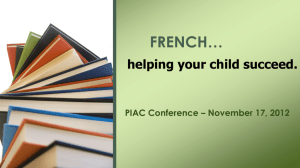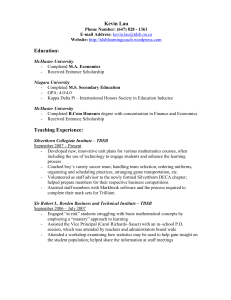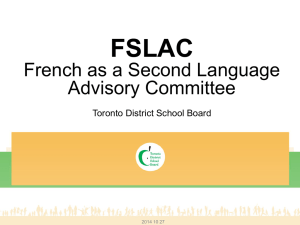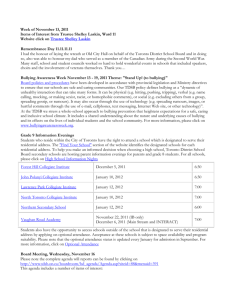French Homework
advertisement
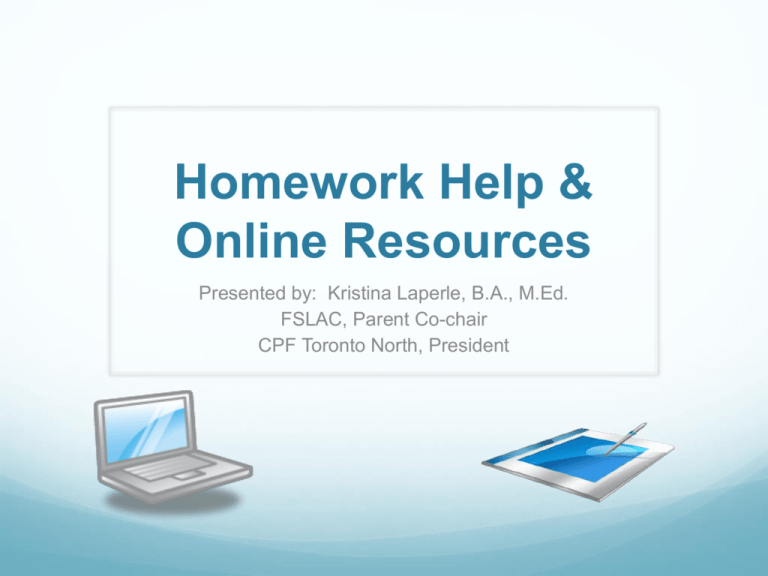
Homework Help & Online Resources Presented by: Kristina Laperle, B.A., M.Ed. FSLAC, Parent Co-chair CPF Toronto North, President Agenda 1. TDSB Homework Policy 2. Types of homework, responsibilities, and expectations 3. Homework Tips 4. Online resources TDSB and Ministry resources 5. Public library resources 6. Canadian Parents for French (CPF) recommended resources 7. Apps Please feel free to ask questions at any time. TDSB Homework Policy Available in 13 languages Can be found under the TDSB website in the Parents’ section www.tdsb.on.ca/ Since September 2008: “The policy balances time required to complete homework with extra curricular activities scheduled outside of the school day and activities that support personal and family wellness.” Types of Homework There are four types of commonly assigned homework, each having a different intended outcome as shown below. Completion Practice Preparation Extension Homework Policy “Homework assignments shall be clearly articulated and carefully planned…where appropriate, homework assignments shall be differentiated to reflect the unique needs of the child.” “are designed to require no additional teaching outside the classroom and are engaging and relevant to student learning. Students understand what is expected of them before leaving school.” Homework: Quantity JK-Gr.3 JK/SK – “Homework should not be assigned to Kindergarten students…families are encouraged to engage in early learning activities such as playing, talking and reading together in English or in the family’s first language.” Grades 1-3 – “There is a strong connection between reading to or with …children every day in English or in one’s first language and student achievement. As a result, homework assigned… shall more often take the form of reading, playing a variety of games, having discussions and interactive activities such as building and cooking with the family.” Homework: Quantity Gr. 4-6 In the late Primary and Junior grades, effective homework may begin to take the form of independent work. In both cases, homework assigned for completion, practice, preparation or extension should be clearly articulated and differentiated to reflect the unique needs of the child. **You and your child’s teacher know your child best. If you want your child to get additional homework, ask your child’s teacher for advice. Roles & Responsibilities Teachers encouraging a partnership with family and students that promotes… communication and supports families in the homework process; Students ensuring that he/she clearly understands the homework assigned, i.e. assignments, criteria, and timelines, and asks for clarification or assistance from the teacher when not clear regularly assigning homework… appropriate to the student’s age, developmental level, learning style, skills and individual needs Completing homework in a timely manner to the best of his/her ability teaching the skills necessary… to complete the homework and become successful independent learners managing time and materials, e.g. by bringing home necessary materials. Family Responsibilities reading in English, French (French Immersion) and/or the family’s first language throughout the elementary years of their children’s education providing an environment, i.e. workplace, block of uninterrupted time, usually in the home or in an alternative setting…for homework to be done providing encouragement and appropriate support without doing the homework for their child Family Responsibilities (con’t..) providing a healthy balance between homework, cocurricular activities and family commitments stopping their child from continuing to complete homework at bedtime, even if the child is not done contacting the classroom teacher if their child is not consistently able to do the homework by him/herself or if challenges or questions arise. Homework tips Teachers know most parents don’t speak French and assign homework that can be done independently Homework is often unfinished class work, or just a review of the classroom work Ask your child about the classroom routine Discuss homework expectations and what’s ahead with the teacher Stay ahead of the game - know what is being covered in class and help prepare your child by working with the themes and skills at home in your first language Check your child’s agenda and backpack. Discuss what you find and what you see posted in and around the classroom with your child. “I REALLY don’t understand the homework.” What do I do? Start with a good homework routine in a calm environment – No DISTRACTIONS! Ask the child to “think back”. What did he/she do in class? What did the teacher say? Get the child to call a friend/classmate Ensure a good effort is made Use a dictionary (avoid website translations of longer phrases and texts) and online TDSB resources Use the agenda to tell the teacher how the homework went Encourage your child to talk with the teacher the next day Expectations: Dos and DON’Ts Do look for progress over time - how is your child is doing today compared to last week or last month? Do encourage your child to explain to you in English what she is learning or reading, or watching on French TV Don’t expect your child to do perfect word for word translations, even in high-school- translations are not part of the expectations of the programs Don’t compare your child to other children in other classes. Though the curriculum is the same, concepts may be taught in a different order Don’t worry – NOT knowing French can give you an edge in getting your child to think for himself! READING Skills transfer -Read with your child in your native language - you don’t need to read in French – (That’s the students’/teachers’ job) Develop a love of reading : Have books available at home, and visit the library together - Talk and read to your child in your first language Model reading at home – Let your child see you enjoy reading Reading is more about reading for meaning and making connections to experiences and not just about the sounds of letters, or pronunciation of words – (literacy workshop) Most importantly: praise your child to create a pleasant feeling What if my child’s book is in French? Have the child read the book in French out loud to you Have your child explain the story in your native language Try to figure out meaning from pictures - Start with the cover of the book Ask a lot of predicting questions and clarifying questions “What do you think will happen next?” ‘What do you think that means?” If the book is French, con’t… Have your child teach you some French words Use word families and context to guess meanings for unknown words instead of referring to a French dictionary Ask your child why he/she chose the book Play word games (count the words, find a word that…) WRITING & SPELLING Keep a French journal (picture + text) Write a short storybook for fun Copy sentences from a published book and draw your own pictures Do crosswords, word search or other vocabulary & spelling games – paper, online or app versions Play hangman using old vocabulary lists provided by teachers SPEAKING & LISTENING DVDs- select the French language option. Or, watch a French movie with the French subtitles on to catch all the vocabulary Find apps for your phone or tablet Watch TV in French Rogers 12, 13, 130 Bell 112, 115, 137, 145 listen to French radio: 860 AM, 90.3 FM, 105.1 FM Look into French camps Get a tutor/babysitter to play in French Invite a classmate over and role-play in French, ie. French restaurant, “Boutique Chez Nous” Academic Support & Curriculum Knowledge Discuss class ‘themes’ in your own language –know the curriculum and stay ahead Visit TDSB website for Curriculum documents and sample activities www.tdsb.on.ca Look for “Overall Expectations” and “Specific Expectations” Buy workbooks appropriate to your child’s grade level – available at Scholastic, Indigo, Sonsuh Websites with graded activities (see links under “Elementary Subjects” on the TDSB library website) Make it FUN by adding experiential learning activities at Toronto’s many attractions Online Resources & Apps 1. School / TDSB recommended websites 2. Toronto Public Library online resources (eBooks) 3. CPF Recommended websites 2. Apps for SK-Grade 3 3. Apps for grade 3 & up 4. App review site & Other great apps TDSB/School Library Website www.tdsb.on.ca/libraries - The following links on the TDSB Library website are particularly useful for Elementary School students. See your “The Inquiry Journey” bookmark for Logins and Passwords where necessary. E-BOOKS > Bookflix ELEMENTARY SUBJECTS Language > Storyvalues Mathematics > Coolmath4kids Mathematics > Math Homework Help ONLINE DATABASES > OERB (Ontario Educational Resource Bank) IMAGES & MEDIA > Learn360 OERB Ontario Educational Resource Bank Access through the TDSB Libraries website or directly through https://resources.elearningontario.ca/ More than 27000 resources & interactive activities in English and French, many created by teachers! Organized by topic, grade, curriculum expectations, learning style, etc… Search tips: Use “Browse by Curriculum”, select “grade” and “subject”. Do NOT select by “strand” or “French language”. This greatly limits options Kids love “Interactive Learning” under “Resource Filter Types” on the left side panel. Learn360 – Great videos! Access through the TDSB Libraries website or directly through www.learn360.com BROWSE BY: “Subject Area”, “Grade Level”, and/or “Media Format” Search tips: Choose your preferred subject area and grade level Kids love “Full Videos” Video length listed below the video thumbnail Toronto Public Library From the main page go to “Downloads & ebooks” Overdrive ebooks & eAudiobooks From “Language Collections” select “eBooks francais” (over 500 titles) “Livres audio francais” (26 titles) Tumble Book Library has 40 titles in French Select “Language Learning” CPF Online Resources Specifically for homework in FRENCH: Canadian Parents for French Ontario www.cpfont.on.ca -Contains many helpful links, especially Homework Toolbox & “Yes, you can help!” (listed below) Homework Toolbox www.fslhomeworktoolbox.ca “Yes, you can help!” by the Government of Alberta, Ministry of Education education.alberta.ca/parents/resources/youcanhelp.aspx FSL Homework Toolbox www.fslhomeworktoolbox.ca This website produced by Rainbow DSB based on a needs assessment survey conducted by CPF with the financial support of the Ontario Ministry of Education and the Government of Canada through the Department of Canadian Heritage. FSL Homework Toolbox Sections Audio files in French English video clips demonstrating instructional strategies a reference guide for specific topics a list of French language learning websites general tips for learning French www.fslhomeworktoolbox.ca Grammar & Spelling Checker bonpatron.com Cut and paste your child’s typed text into the box Mistakes are highlighted in different colours and explanations are provided in English or French. Hover the cursor over the highlighted text to see the explanation. Youtube & Online Videos Look for themed books, TV shows, movies on Youtube or Google ‘videos’ Ex. Grade 3 - NATIVE LIFE & EARLY SETTLERS Little House on the Prairie, Anne of Green Gables, Dances with Wolves, Pocahontas, etc…(Check the library) Recommended Apps for SK-grade 2 TFO & Mini-TFO iLearnWith (iLW) Mind Snacks – French Abc! Colors Feed me – Francais Qui suis-je? Fruits et animaux (matching activities: fruits and animals) Les Comptines de Zoreil (songs with videos) TEMBO 4 (stories with or without audio) Recommended Apps for Grade 3 and up TFO & mini TFO Quiz Animo / Brigado Animo (cbc) French Vocab Games Lite (full App $3.99) Revise ta Conjugaisons Letris 4 Brain Pop & Brain Pop Jr. Essentials (beginner adult - vocabulary) Le Robert Dixel Mobile (dictionary App) App review sites & places to find apps edululu.org – app review website by TFO Appyfamily.wordpress.com (Under ‘Categories’ choose “French”) Check out “Customers also bought” section Many of your favourite apps may also be available in French – check for “Languages” in the “Information” section of iTunes The “Plan” for Curriculum Enrichment at home Plan your extra-curricular support time, just like you would any other activity and put it in your calendar, ie. 1 hr./day, or Sunday afternoons, or Monday evenings Academic Enrichment takes time, like any other extracurricular activity Change your subject of focus daily / weekly / monthly Let your child choose Reward with field trips or educational games Make it FUN in English or French! Go to the library for books, books with CD, or videos Play educational games or apps Look for themed books, TV shows, movies or Youtube videos Go on family field trips – Do they do tours in French? NATIVE LIFE & EARLY SETTLERS Crawford Lake & Conservation Area, Black Creek Pioneer Village, Royal Ontario Museum, Native Canadian Centre of Toronto, etc… Little House on the Prairie, Anne of Green Gables, Dances with Wolves, Pocahontas, etc…(Check the library) Additional ideas for French practice… Look at labels on packages – which French words do you know? FRENCH BONUS TIME Give an extra 15-20 minutes of computer games, TV or reading time before bed IF IT’S DONE IN FRENCH! Adult French Classes for you so you can practice together! Toronto Public Library – French Storytime and other programs, and LOTS OF BOOKS, CDs and DVDs! French / Bilingual camps for kids Exchange programs Thank you! Merci! For more information on FSL resources for parents, please check out the following websites: www.tdsb.on.ca/fslac & www.cpf.ca and www.on.cpf.ca

